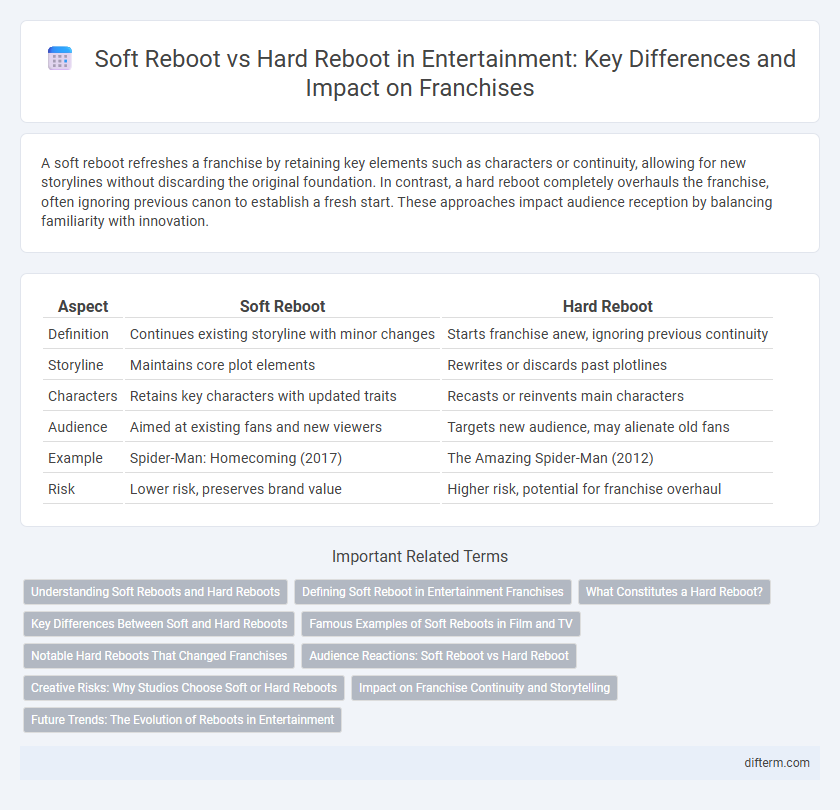A soft reboot refreshes a franchise by retaining key elements such as characters or continuity, allowing for new storylines without discarding the original foundation. In contrast, a hard reboot completely overhauls the franchise, often ignoring previous canon to establish a fresh start. These approaches impact audience reception by balancing familiarity with innovation.
Table of Comparison
| Aspect | Soft Reboot | Hard Reboot |
|---|---|---|
| Definition | Continues existing storyline with minor changes | Starts franchise anew, ignoring previous continuity |
| Storyline | Maintains core plot elements | Rewrites or discards past plotlines |
| Characters | Retains key characters with updated traits | Recasts or reinvents main characters |
| Audience | Aimed at existing fans and new viewers | Targets new audience, may alienate old fans |
| Example | Spider-Man: Homecoming (2017) | The Amazing Spider-Man (2012) |
| Risk | Lower risk, preserves brand value | Higher risk, potential for franchise overhaul |
Understanding Soft Reboots and Hard Reboots
Soft reboots in entertainment involve resetting a franchise's storyline while retaining core characters and continuity elements, allowing for creative reinvention without alienating existing fans. Hard reboots completely overhaul the franchise by discarding previous canon and starting fresh, often introducing new characters, settings, and narratives to attract a broader or different audience. Understanding these distinctions is crucial for evaluating how studios balance innovation and legacy in long-running series.
Defining Soft Reboot in Entertainment Franchises
Soft reboot in entertainment franchises refers to the practice of revitalizing a series by retaining key elements such as characters or settings while discarding previous continuity or backstory. This approach allows creators to attract new audiences without completely alienating existing fans, offering a fresh narrative direction without a total reset. Soft reboots balance familiarity with innovation, often leading to renewed interest and extended franchise longevity.
What Constitutes a Hard Reboot?
A hard reboot in entertainment involves discarding previous storylines and continuity to start fresh, often with new characters, settings, and plot directions, effectively resetting the franchise's narrative universe. This approach allows creators to redefine core elements without constraints from prior installments, offering a clean slate for audiences. Iconic examples include the 2009 "Star Trek" film and the 2018 "Halloween" movie, which completely reimagined their respective franchises' timelines.
Key Differences Between Soft and Hard Reboots
Soft reboots in entertainment retain core elements such as characters and continuity while refreshing the storyline or tone, often appealing to existing fans and maintaining brand familiarity. Hard reboots completely overhaul the franchise by discarding previous continuity, redesigning characters, and reimagining the narrative to attract new audiences or redefine the brand identity. The key differences lie in narrative continuity, audience targeting, and creative approach, with soft reboots focusing on evolution and hard reboots emphasizing reinvention.
Famous Examples of Soft Reboots in Film and TV
Soft reboots in film and TV often retain key characters or story elements while refreshing the narrative, as seen in Marvel Studios' "Spider-Man: Homecoming," which reimagines Peter Parker's origin within the MCU. The 2009 "Star Trek" film revitalizes the franchise by combining familiar characters with a new timeline, appealing to both longtime fans and newcomers. Another example is "Battlestar Galactica" (2004), which reinterprets the 1978 series, maintaining core themes but introducing contemporary storytelling and character depth.
Notable Hard Reboots That Changed Franchises
Notable hard reboots in entertainment, such as "Batman Begins" (2005) and "Spider-Man" (2012), significantly altered their franchises by completely discarding previous continuities and rebuilding characters, tone, and storylines from scratch. These hard reboots often lead to renewed critical acclaim and box office success by modernizing the narrative and appealing to new audiences. The distinct departure from prior iterations differentiates hard reboots from soft reboots, which retain much of the established continuity while refreshing elements.
Audience Reactions: Soft Reboot vs Hard Reboot
Audience reactions to soft reboots often include appreciation for familiar characters and storylines presented with fresh twists, allowing nostalgic engagement while welcoming new viewers. Hard reboots tend to polarize fans due to complete overhauls in tone, casting, and narratives, which can alienate long-time followers but attract audiences seeking innovation. Box office performance and critical reviews frequently reflect these divided responses, highlighting the risk-reward balance studios face between preserving legacy and reinventing franchises.
Creative Risks: Why Studios Choose Soft or Hard Reboots
Studios opt for soft reboots to balance creative risks by refreshing storylines and characters while retaining familiar elements that appeal to existing fans, minimizing alienation. Hard reboots embrace higher risks by completely overhauling narratives and character arcs to attract new audiences and revitalize franchises, often resulting in bold artistic innovation. Both strategies reflect calculated decisions to either maintain brand continuity or pursue dramatic reinvention, impacting box office performance and critical reception.
Impact on Franchise Continuity and Storytelling
Soft reboots preserve key elements of an existing franchise's continuity while refreshing characters and story arcs to appeal to new audiences, maintaining narrative cohesion and fan loyalty. Hard reboots discard established continuity, allowing creators to overhaul storylines and character backgrounds, often resulting in drastic tonal shifts but risking alienation of long-time fans. The choice between soft and hard reboot directly impacts franchise sustainability, balancing creative innovation with respect for the original mythology.
Future Trends: The Evolution of Reboots in Entertainment
Future trends in entertainment indicate a growing preference for soft reboots, which preserve original storylines and fan loyalty while modernizing characters and settings. Hard reboots completely overhaul existing franchises, offering fresh narratives but risking alienation of established audiences. Streaming platforms are driving this evolution by favoring content that balances innovation with familiarity to maximize viewer engagement and franchise longevity.
Soft reboot vs hard reboot Infographic

 difterm.com
difterm.com